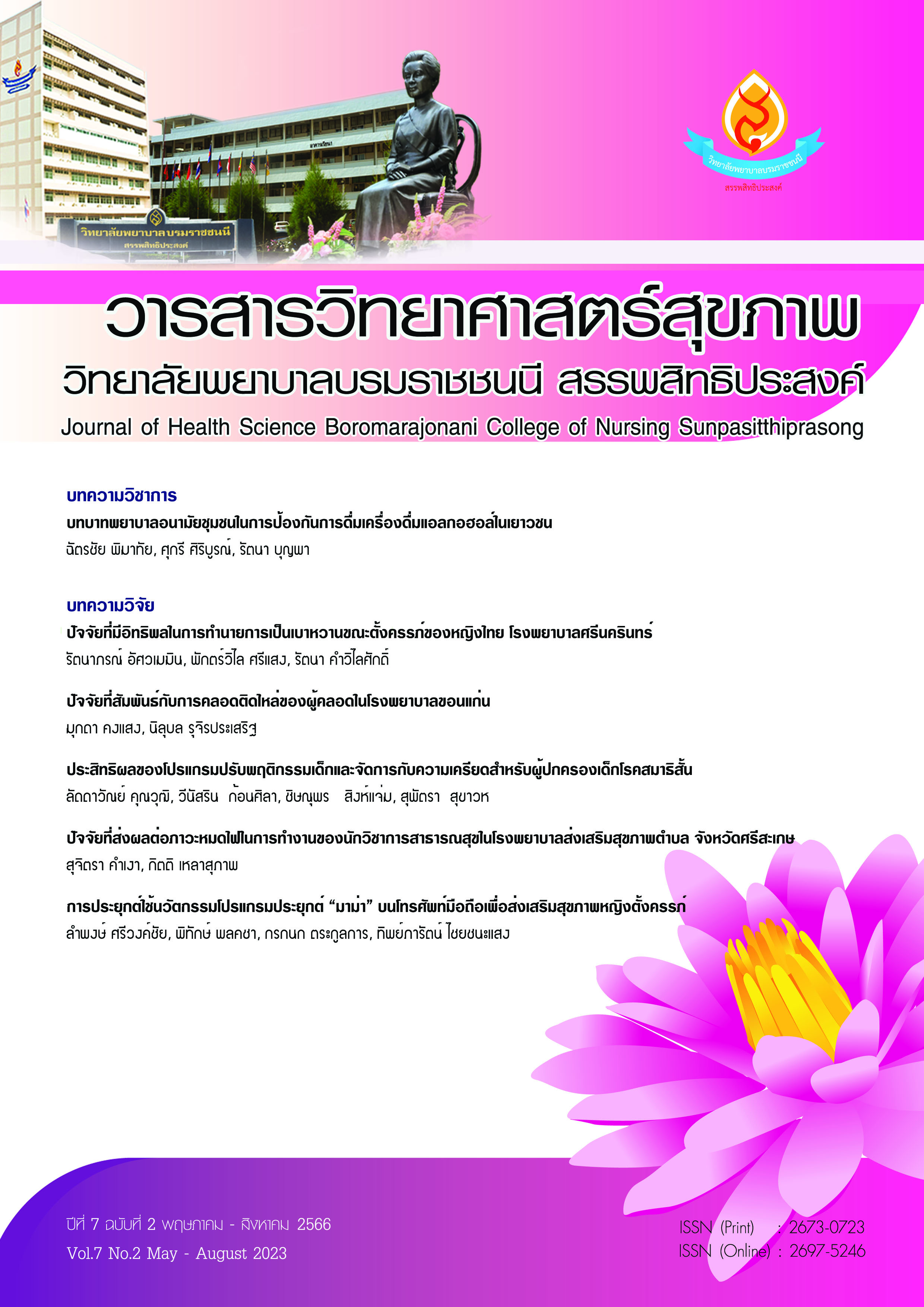ปัจจัยที่มีอิทธิพลในการทำนายการเป็นเบาหวานขณะตั้งครรภ์ของหญิงไทย โรงพยาบาลศรีนครินทร์
Main Article Content
บทคัดย่อ
เบาหวานขณะตั้งครรภ์มีแนวโน้มเพิ่มขึ้นเรื่อย ๆ ส่งผลด้านลบต่อภาวะสุขภาพของมารดาและทารก ปัจจัยเสี่ยงต่อการเป็นเบาหวานขณะตั้งครรภ์มีทั้งปัจจัยด้านประวัติสุขภาพ และปัจจัยด้านพฤติกรรมสุขภาพ ซึ่งแต่ละปัจจัยส่งผลต่อระดับความเสี่ยงเบาหวานขณะตั้งครรภ์ที่แตกต่างกัน การวิจัยนี้เป็นการศึกษาแบบ cohort study โดยมีวัตถุประสงค์เพื่อศึกษาปัจจัยที่มีอิทธิพลในการทำนายการเป็นเบาหวานขณะตั้งครรภ์ในหญิงไทย โดยเก็บข้อมูลกลุ่มตัวอย่างหญิงตั้งครรภ์ที่แผนกฝากครรภ์ โรงพยาบาลศรีนครินทร์ จังหวัดขอนแก่น 161 ราย เครื่องมือในการวิจัยเป็นแบบสอบถาม และวิเคราะห์ปัจจัยที่มีอิทธิพลในการทำนายการเป็นเบาหวานขณะตั้งครรภ์ด้วยสถิติ binary logistic regression ผลการศึกษาพบว่า ปัจจัยที่มีอิทธิพลในการทำนายการเป็นเบาหวานขณะตั้งครรภ์อย่างมีนัยสำคัญทางสถิติมี 3 ปัจจัย ได้แก่ 1) ประวัติเคยเป็นเบาหวานขณะตั้งครรภ์ในครรภ์ก่อน (OR = 17.48, 95%CI 1.74-175.38) 2) ประวัติญาติสายตรงเป็นเบาหวาน (OR = 2.41, 95%CI 1.03-5.65) และ 3) พฤติกรรมรับประทานอาหารจานด่วน (fast food) มากเกินปกติ (OR = 2.45, 95%CI 1.03-5.79) จากปัจจัยเสี่ยงที่พบ หญิงตั้งครรภ์ทุกคนควรได้รับการประเมินความเสี่ยงต่อเบาหวานขณะตั้งครรภ์ทั้งด้านประวัติสุขภาพและพฤติกรรมสุขภาพ แนะนำให้หลีกเลี่ยงการรับประทานอาหารจานด่วน (fast food) ในปริมาณที่มากเกินปกติ ทั้งนี้ควรมีการศึกษาเพิ่มเติมเพื่อให้ครอบคลุมปัจจัยเสี่ยงที่หลากหลาย และผลการวิจัยสามารถนำไปสู่การพัฒนาแบบประเมินระดับความเสี่ยงต่อเบาหวานขณะตั้งครรภ์
Article Details

อนุญาตภายใต้เงื่อนไข Creative Commons Attribution-NonCommercial-NoDerivatives 4.0 International License.
บทความที่ได้รับการตีพิมพ์เป็นลิขสิทธิ์ของวารสารวิทยาศาสตร์สุขภาพ วิทยาลัยพยาบาลบรมราชชนนี สรรพสิทธิประสงค์ ข้อความที่ปรากฏในบทความแต่ละเรื่องเป็นความคิดเห็นส่วนตัวของผู้เขียนแต่ละท่านไม่เกี่ยวข้องกับวิทยาลัยพยาบาลบรมราชชนนี สรรพสิทธิประสงค์ และคณาจารย์ท่านอื่นๆ ในวิทยาลัยพยาบาลฯ ความรับผิดชอบเกี่ยวกับบทความแต่ละเรื่องผู้เขียนจะรับผิดชอบของตนเอง
เอกสารอ้างอิง
Caissutti C, Berghella V. Scientific evidence for different options for GDM screening and management: controversies and review of the literature. Biomed Res Int 2017:1-12. doi: 10.1155/2017/2746471.
Lee KW, Ching SM, Ramachandran V, Yee A, Hoo FK, Chia YC, et al. Prevalence and risk factors of gestational diabetes mellitus in Asia: a systematic review and meta-analysis. BMC Pregnancy Childbirth 2018;18:494. doi: 10.1186/s12884-018-2131-4
Wendland EM, Torloni MR, Falavigna M, Trujillo J, Dode MA, Campos MA, et al. Schmidt MI. Gestational diabetes and pregnancy outcomes--a systematic review of the World Health Organization (WHO) and the International Association of Diabetes in Pregnancy Study Groups (IADPSG) diagnostic criteria. BMC Pregnancy Childbirth 2012;12:23. doi: 10.1186/1471-2393-12-23.
Catalano PM, McIntyre HD, Cruickshank JK, McCance DR, Dyer AR, Metzger BE, et al. Hadden DR. The hyperglycemia and adverse pregnancy outcome study: associations of GDM and obesity with pregnancy outcomes. Diabetes Care 2012;35:780-6.
Dahiya K, Sahu J, Dahiya A. Maternal and Fetal Outcome in Gestational Diabetes Mellitus-A Study at Tertiary Health Centre in Northern India. Open Access Lib J 2014;1:1-5. doi: 10.4236/oalib.1100500.
Cunningham FG, Kenneth JL, Steven LB, Catherine YS, Jodie SD, Barbara LH, Brian MC, Jeanne SS. Williams Obstretics 24th Edition. London; 2014.
Priyanka. Maternal and foetal outcome in patients of gestational diabetes mellitus. Int J Reprod Contracept Obstet Gynecol 2018;7:3831-6.
Moncrieff G. Gestational diabetes. Br J Midwifery 2018;26:506-13.
Torloni MR, Betran AP, Horta BL, Nakamura MU, Atallah AN, Moron AF, Valente O. Prepregnancy BMI and the risk of gestational diabetes: a systematic review of the literature with meta‐analysis. Obes Rev 2009;10:194-203. doi: 10.1111/j.1467-789X.2008.00541.x
Mishra S, Kishore S. Effect of physical activity during pregnancy on gestational diabetes mellitus. Indian J Endocr Metab 2018;22:661-71.
Pang WW, Colega M, Cai S, Chan YH, Padmapriya N, Chen LW, et al. Higher Maternal Dietary Protein Intake Is Associated with a Higher Risk of Gestational Diabetes Mellitus in a Multiethnic Asian Cohort. J Nutr 2017;147:653–60. doi: 10.3945/jn.116.243881
Bowers K, Tobias DK, Yeung E, Hu FB, Zhang C. A prospective study of prepregnancy dietary fat intake and risk of gestational diabetes. Am J Clin Nutr 2012;95:446-53.
Schoenaker DA, Mishra GD, Callaway LK, Soedamah-Muthu SS. The role of energy, nutrients, foods, and dietary patterns in the development of gestational diabetes mellitus: a systematic review of observational studies. Diabetes Care 2016;39:16-23.
ปิยะนันท์ ลิมเรืองรอง, ดิฐกานต์ บริบูรณ์หิรัญสาร, อภิธาน พวงศรีเจริญ, อรวรรณ พินิจเลิศสกุล. ปัจจัยที่มีอิทธิพลต่อการเกิดภาวะเบาหวานขณะตั้งครรภ์ในสตรีตั้งครรภ์ที่มี Glucose Challenge Test ผิดปกติ. วารสารพยาบาลศาสตร์ 2559;34:58-69.
Qiu C, Enquobahrie D, Frederick IO, Abetew D, Williams MA. Glucose intolerance and gestational diabetes risk in relation to sleep duration and snoring during pregnancy: A pilot study. BMC women's health 2010;10:17. doi: 10.1186/1472-6874-10-17.
Garrison A. Screening, Diagnosis, and Management of Gestational Diabetes Mellitus. Am Fam Physician 2015;91:460-7.
The Joanna Briggs Institute. New JBI Levels of Evidence [Internet]. 2013 [cited 2018 May 1]. Available from: http://joannabriggs.org/jbi-approach.html#tabbed-nav=Levels-of-Evidence
American Diabetes Association. Classification and diagnosis of diabetes: Standards of Medical Care in Diabetes 2019. Diabetes Care 2019;19:S13–S28.
อรุณ จิรวัฒน์กุล. สถิติในงานวิจัย เลือกใช้อย่างไรให้เหมาะสม. พิมพ์ครั้งที่ 2. กรุงเทพฯ: วิทยพัฒน์; 2558.
Caliskan E, Kayikcioglu F, Öztürk N, Koc S, Haberal A. A population-based risk factor scoring will decrease unnecessary testing for the diagnosis of gestational diabetes mellitus. Acta Obstet Gynecol Scand 2004;83:524–30.
Naylor CD, Sermer M, Chen E, Farine D. Selective Screening for Gestational Diabetes Mellitus. N Engl J Med 1997;337:1591-6.
พรพิมล รัตนาวิวัฒน์พงศ์, อารมย์ ขุนภาษี, ฉกาจ ผ่องอักษร,ภัทราวุธ อินทรกำแหง. ความเที่ยงตรงและความน่าเชื่อถือของแบบสอบถามสากลเรื่องกิจกรรมทางกายชุดสั้นฉบับภาษาไทย. เวชศาสตร์ฟื้นฟูสาร 2549;16:147-60.
Gao C, Sun X, Lu L, Liu F, Yuan J. Prevalence of gestational diabetes mellitus in mainland China: A systematic review and meta-analysis. J Diabetes Investig 2019; 10:154-62. doi: 10.1111/jdi.12854.
Sirirat S, Ruangvutilert P, Yapan P, Boriboonhirunsarn D. Prevalence of Gestational Diabetes Mellitus among Women with Lower Risk for Gestational Diabetes in Siriraj Hospital. Thai J Obstet Gynaecol 2022;30:313-20.
World Health Organization (WHO). International Association for the Study of Obesity (IASO) and International Obesity Task Force (IOTF). The Asia-Pacific Perspective: Redefining Obesity and its Treatment. Geneva: World Health Organization; 2000. p. 378-420.
Boden G, Chen X, Ruiz J, White JV, Rossetti L. Mechanisms of fatty acid-induced inhibition of glucose uptake. J Clin Invest 1994;93:2438–46.
Cunningham F, Leveno KJ, Dashe JS, Hoffman BL, Spong CY, Casey BM (Eds.). Endocrine disorders. Williams Obstetrics 26e. Mc Graw Hill; 2022.


